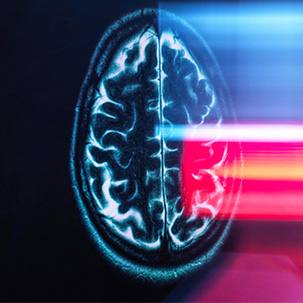-
Research
Unique Mayo team helping to move ‘omics’ science forward to transform patient care

Behind the front lines of Mayo Clinic researchers who are working to cure cancer and other diseases with "omics" data is a specialized team of translational science experts helping to push these intensive experiments across the finish line.
One of these translational clinical scientists is Jan Egan, Ph.D., in Mayo Clinic's Center for Individualized Medicine and the Department of Research at Mayo Clinic Arizona. Dr. Egan has been integral in creating the Omics Concierge Service (OmiCS). Its purpose is to accelerate the translation of omics-related medical discoveries from the lab to the clinic, so patients can potentially benefit from their omics data, clinicians can properly use this information when treating patients, and ultimately, patients may have improved health outcomes.
Omics is an emerging multidisciplinary field of biological sciences that encompasses genomics, proteomics, exposomics, epigenomics, transcriptomics, metabolomics and more. Omics data hold transformative possibilities for helping researchers predict and diagnose diseases, such as cancer, and devise individualized treatments tailored to a person's unique biological characteristics.
"We're working to empower investigators to transform patient care by providing strategic omics scientific guidance," says Dr. Egan.

With omics investigations, researchers use a toolkit of scientific precision methods — such as DNA sequencing, microarrays, mass spectrometry and other high-throughput technologies. The researchers can use these technologies to simultaneously measure and analyze various biological omics molecules at multiple levels deep inside human cells, tissues and organisms — where many diseases evolve.
Dr. Egan says omics research typically accumulates massive amounts of data, which can be overwhelming, especially for new investigators. It's part of the reason she launched the Omics Concierge Service — to guide scientists in harnessing the right omics data sets and to help throughout the perplexing research process… from start to publish.
"We're helping investigators strategically move from, 'I have an idea, and I want to use this data, but I'm not quite sure how,' to developing that idea into a testable hypothesis and aims," Dr. Egan explains. "If they get stuck, we can help them determine what they need to do in order to get their project back on track. It's not about doing the work for them, but rather assisting them in understanding what they need to do in order for their project to be successful."
Dr. Egan says the Concierge Service is also encouraging collaborations between scientists who are working on similar or overlapping studies.
"It's helping to bring silos down," she says. "Someone in Rochester may be doing work that someone in Arizona or Florida doesn't know about. We're initiating conversations between researchers to say, 'How can we work together?'"
Dr. Egan says the Omics Concierge Service was also created to realize the full potential of Mayo Clinic's new Omics Data Platform, a vast and innovative omics data infrastructure that is secure and accessible to physicians and researchers looking to glean insights into diseases.
“The centralization of all Mayo patient omics data into a single, organized and efficient repository is stimulating new opportunities for improving the care and treatment of our patients" says Eric Klee, Ph.D., the Midwest Associate Director of Research and Innovation in the Center for Individualized Medicine.
Dr. Klee says, to help comb through the mountains of data, researchers are increasingly using artificial intelligence to discover patterns and solutions, while relying on bioethics experts to help navigate critical issues.
Over the last year, omics investigations at Mayo Clinic's Center for Individualized Medicine have enabled scientists to predict antidepressant response in people with depression and discover a potential therapeutic strategy for a bone marrow cancer. Scientists have also used omics to pinpoint genetic variations that cause severe COVID-19, uncover potential clues for preventing and treating gliomas and unravel the genetic mystery of rare neurodevelopmental disorder.
Dr. Egan says she's grateful to contribute to this new era of omics research.
"We're moving science forward to transform the care of today to be better tomorrow."
Learn more
Read more stories about advances in individualized medicine.
Register to get weekly updates from the Mayo Clinic Center for Individualized Medicine blog.
Join the conversation
For more information, visit Mayo Clinic Center for Individualized Medicine, or Twitter at @MayoClinicCIM.








